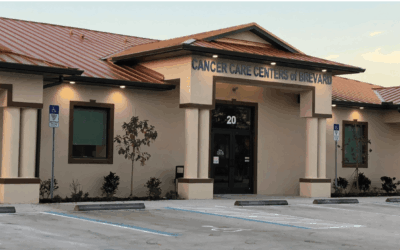Clinical Research Trials for Cancer in Brevard County
Cancer research trials through CCCB make it possible for Brevard county community members to access the latest treatment options close to home. There’s no need to travel long distances to receive the most advanced cancer care with our locations in Palm Bay and Rockledge, Florida.
Through our partnership with the Sarah Cannon Research Institute (SCRI), a joint venture with US Oncology Research, our cancer specialists offer some of the most recent breakthroughs in cancer treatment to our patients who qualify to participate. Our team of cancer research experts includes our oncologists and research nurses, who are dedicated to helping patients access trials whenever appropriate.
Together, we have made significant progress in developing breakthrough treatments for various cancers, including breast cancer, lung cancer, prostate cancer, and colorectal cancer. If you or a loved one was diagnosed with cancer – whether this is the initial diagnosis or a recurrence – there may be a trial available to you. Talk with our team for more information.
Understanding Clinical Trials
Purpose and Importance of Cancer Research Trials
Clinical trials are a key research tool for developing new and better treatment therapies for all types of cancer. Without cancer research and clinical trial participants, most of the cancer treatments used today as a standard treatment would not be available.
There are four different types of clinical trials, which include:
Treatment trials: Testing new drugs, medical procedures, or combinations of treatments. Most clinical research trials available to patients at Cancer Care Centers of Brevard are in this category.
Prevention trials: Looking at cancer risk and ways to reduce that risk by doing something (called action studies) like making lifestyle changes or taking something (called agent studies) such as medicines, vitamins, or minerals.
Screening trials: Testing new ways to find a disease early, when it may be more easily treated.
Quality of life trials: Exploring ways to improve cancer patients' comfort and quality of life.
For more information, contact a clinical research nurse at one of the Cancer Care Centers of Brevard locations below.
Jessica Starr
Clinical Research Nurse
Palm Bay - Medical Oncology
20 San Filippo SE, Palm Bay, FL 32909
Jennifer Sandle
Clinical Research Coordinator
Rockledge
1048 Harvin Way, Rockledge, FL 32955
How Cancer Research Trials are Conducted
Physicians and cancer researchers design clinical trials to better understand how a new treatment works or how existing cancer treatments can be combined for better outcomes. Every research trial is conducted according to strict scientific and ethical principles. Before each study begins, a protocol is developed describing the process and the necessity of each part of the study. Before the trial starts, a third-party committee consisting of cancer specialists will review the protocol to ensure its safety for participants.
Each study has eligibility criteria for who can or cannot participate, which may include the type of cancer, past cancer treatment regimens, age, gender, medical history, and current health status.
Randomization
Every patient participating in a clinical trial will receive life-saving treatment. Clinical trial randomization is the process of assigning patients randomly to groups that receive different treatments. In the simplest trial design, the investigational group receives the new treatment, and the control group receives standard therapy. Researchers compare the groups at several points during and at the end of the clinical trial to see which treatment is more effective or has fewer side effects.
Randomization helps prevent bias. Bias occurs when a trial's results are affected by human choices or preferences that could cause the results to be skewed.
Randomization happens in all Phase III trials and some Phase II trials.
Phases of Clinical Trials
Clinical trials are structured into four different phases. Most clinical trials at Cancer Care Centers of Brevard are Phase III (3) or Phase IV (4).
Phase I: Phase 1 clinical trials are designed to test a new therapy in a small group of people (about 15-30) for the first time to evaluate the safety, including safe dosage range and possible side effects. It can include healthy participants or patients.
Phase II: Phase 2 clinical trials are designed to study the new therapy in a larger group of people (less than 100) to determine its effectiveness and further evaluate its safety. They are conducted on participants with the condition or disease under study and will determine common short-term adverse effects and risks.
Phase III: Phase 3 clinical trials are designed to study the effectiveness of the new therapy in large groups of patients (from 100 to thousands) by comparing it to other standard or experimental therapies. They also monitor adverse effects and collect information that will allow the therapy being studied to be used safely.
Phase IV: Phase 4 clinical trials are conducted after a therapy has been approved by the FDA and is marketed. Many of these studies are designed to monitor the effectiveness of a newly approved treatment in the general population and to collect information about any adverse effects associated with widespread use.
Learn more about cancer research trials work in our frequently asked questions
What to Expect When Participating in a Clinical Trial
If you have been approved for a clinical trial, your cancer care team will provide you with all necessary information, including how the trial will be conducted and the possible risks and benefits involved. You will need to sign a document stating that you have received and understand all the details regarding the trial and that you are willing to participate. This informed consent document still allows you to withdraw from the trial for any reason.
Treatment in a clinical trial can be administered in various ways, depending on the specific trial.
These methods may include:
Oral medication
Injections
Intravenous (IV) medications
Radiation
Surgery
It is important to adhere to the treatment protocol and attend all scheduled appointments. Talk with your care team if you experience any side effects, as these effects are also being studied during the trial. Notifying your care team about side effects also allows them to help you manage them effectively.
After the trial is complete, you will transition to follow-up care. This is a period of monitoring for health updates to help determine whether the drug tested in the trial was safe and effective. Depending on the type of cancer you had and the treatment you received, this could last for months or even years as it helps researchers understand its long-term effectiveness and impact on quality of life.
How Cancer Clinical Trials Can Benefit You
Participating in a clinical trial gives you access to new research treatments before they are widely available. Additionally, your participation also may help others by contributing to medical research. Through clinical trials, you can receive:
Personalized medicine: Your specific genetic markers, mutations, or DNA sequencing into consideration when determining the best treatment approach.
Careful monitoring: Healthcare professionals will monitor your response to the therapy closely, checking for any side effects. Participants in clinical trials are typically monitored more frequently than those receiving standard cancer treatments, and this monitoring continues even after the trial ends.
Safety assurance: Therapies are strictly regulated by the Food and Drug Administration (FDA), with rigorous testing protocols in place before any treatment is approved for testing in humans.
Convenient treatment locations: You can receive treatment at one of many sites that are close to your home.
Access to the latest treatments: You will have the opportunity to try the most innovative therapies before they are available to the general public.
It’s important to understand that clinical trial participation is strictly voluntary, and not every patient qualifies to participate. If you’re interested, ask your oncologist if there is an available trial that you could benefit from.
Those considering participation will be given the key facts, such as the purpose, risks, and benefits of a clinical trial— a process called informed consent. You will never be added to a trial without your approval.
If you choose not to participate, that’s fine, too. If you start the trial and change your mind later, you may withdraw your decision at any time and for any reason.
For most patients, clinical trials are not the first course of treatment that will be tried. But, as you progress through your cancer treatment process, you may qualify for a study that could benefit you and other cancer patients in the future.
Contact us directly, or click on the link below to learn more about the clinical trials available at the Cancer Care Center of Brevard.
For more information, contact a clinical research nurse at one of the Cancer Care Centers of Brevard locations below.
Jessica Starr
Clinical Research Nurse
Palm Bay - Medical Oncology
20 San Filippo SE, Palm Bay, FL 32909
Jennifer Sandle
Clinical Research Coordinator
Rockledge
1048 Harvin Way, Rockledge, FL 32955
Cancer Care Centers of Brevard Locations Offering Clinical Trials
Participating in clinical trials allows us to provide valuable access to new cancer research to people right here in our community. Our patients can access the latest therapies for cancer while their own physician continues to monitor their care. Patients can also remain at home near family and loved ones.

